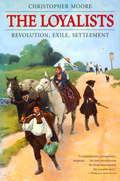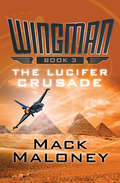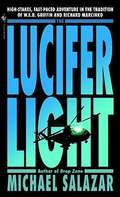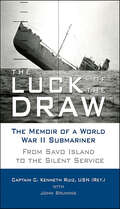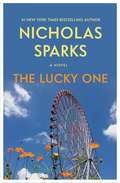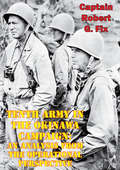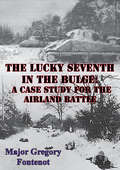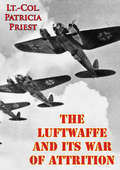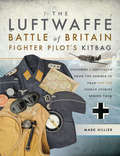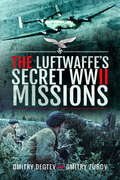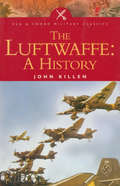- Table View
- List View
The Lover of the Grave: The Lydmouth Crime Series Book 3
by Andrew Taylor'Andrew Taylor is a master story-teller' Daily Telegraph From the No.1 bestselling author of The Ashes of London and The Fire Court, this is the third instalment in the acclaimed Lydmouth seriesAfter the coldest night of the year, they find the man's body. He is dangling from the Hanging Tree on the outskirts of a village near Lydmouth, with his trousers round his ankles. Is it suicide, murder, or accidental death resulting from some bizarre sexual practice?Journalist Jill Francis and Detective Inspector Thornhill become involved in the case in separate ways. Jill is also drawn unwillingly into the affairs of the small public school where the dead man taught. Meanwhile a Peeping Tom is preying upon Lydmouth; Jill has just moved into her own house and is afraid she is being watched. And there are more distractions, on a personal level, for policeman and reporter . . .'An excellent writer. He plots with care and intelligence and the solution to the mystery is satisfyingly chilling' The Times'The most under-rated crime writer in Britain today' Val McDermid 'There is no denying Taylor's talent, his prose exudes a quality uncommon among his contemporaries' Time Out
The Loving Relationships Treasury
by Sondra RayCollected from her groundbreaking series of relationship books, THE LOVING RELATIONSHIPS TREASURY distills the core teachings of Sondra Ray's unique approach to finding, achieving, and maintaining the deepest, most fulfilling relationships possible. Ray's timeless writing continues to inspire us to begin our personal journeys toward integrating intimacy and spirituality within every significant relationship-with ourselves, our mates, our parents, our children, our colleagues, our world.From the Trade Paperback edition.
The Loving Spirit (Virago Modern Classics #128)
by Daphne Du MaurierDaphne du Maurier's lushly written novel . . . is a rapturous celebration of the beauties of the Cornish landscape - Michele Roberts ----------------------------------------------------------------------------------------------------------------------------------------------------Cornwall, 1900s. Plyn Boat Yard is a hive of activity, and Janet Coombe longs to share in the excitement of seafaring: to travel, to have adventures, to know freedom.But constrained by the times, instead she marries her cousin Thomas, a boat builder, and settles down to raise a family.Janet's loving spirit - the passionate yearning for adventure and for love - is passed down to her son, and through him to his children's children. As generations of the family struggle against hardship and loss, their intricately plotted history is set against the greater backdrop of war and social change in Britain. Her debut novel, The Loving Spirit established du Maurier's reputation and style with an inimitable blend of romance, history and adventure.
The Loving Spirit (Vmc Ser. #548)
by Daphne Du MaurierDaphne du Maurier's lushly written novel . . . is a rapturous celebration of the beauties of the Cornish landscape - Michele Roberts----------------------------------------------------------------------------------------------------------------------------------------------------Cornwall, 1900s. Plyn Boat Yard is a hive of activity, and Janet Coombe longs to share in the excitement of seafaring: to travel, to have adventures, to know freedom.But constrained by the times, instead she marries her cousin Thomas, a boat builder, and settles down to raise a family.Janet's loving spirit - the passionate yearning for adventure and for love - is passed down to her son, and through him to his children's children. As generations of the family struggle against hardship and loss, their intricately plotted history is set against the greater backdrop of war and social change in Britain. Her debut novel, The Loving Spirit established du Maurier's reputation and style with an inimitable blend of romance, history and adventure.
The Loyal Conspiracy: The Lords Appellant under Richard II (Routledge Revivals)
by Anthony GoodmanFirst published in 1971, The Loyal Conspiracy gives a detailed examination of the most critical years of the reign of Richard II, through an account of the careers of the Lords Appellant. These were the five great noblemen, ranging from Thomas of Woodstock, the King’s uncle, to Henry of Bolingbroke, later Henry IV, who rose in arms to restrain the activities of Richard II and his partisans in 1387. Anthony Goodman looks, too, at the origins, course and results of this revolt, and his study of these five nobles and the dramatic episode which united them briefly and reluctantly provides a novel and interesting interpretation of an important section of English medieval history. He directs new light on the personalities of Richard and the Lords Appellant, and also on the nature of the polity –it bases and tensions – in later fourteenth-century England. This book will be of interest to students of history and literature.
The Loyalists: Revolution, Exile, Settlement
by Christopher MooreIn 1783 and 1784, some fifty thousand Americans felt that they could not support the revolution against Britain. They were called Loyalists - and there would be no place for them in the new United States.As they streamed into the Canadian colonies to the north, they changed forever the face of settlement there. Their arrival would eventually lead to the formation of the provinces of New Brunswick and Ontario.First published in hardcover in 1984, the bicentenary of the migration, The Loyalists tells the very human story of these people - of the societies that shaped them, the attitudes that motivated them, and the circumstances that determined their future and influenced the future of Canada. It went on to win the Secretary of State's Prize for Excellence in Canadian Studies.From the Trade Paperback edition.
The Lucifer Crusade: Wingman, The Circle War, The Lucifer Crusade, Thunder In The East (Wingman #3)
by Mack MaloneyAfter a devastating Russian attack on the United States, a lone American fighter pilot is out for revenge—even as he evades every air force on earth. When Soviet nukes destroyed the United States, Hawk Hunter took refuge in the only place he has ever felt safe: the sky. One of the finest fighter pilots of all time, he used his talents to found the Pacific American Air Corps (PAAC), a democratic counterweight to the corruption that dominates the rest of the country. Their first action was the Circle War: a Russian invasion led by the sinister terrorist Viktor Robotov. The PAAC expelled the Russians, but Robotov managed to escape. And the Wingman has taken up the pursuit. In a world where it&’s a crime to wave stars and stripes, Hunter paints his F-16 red, white, and blue. Pursued by every air force on Earth, he tears up the sky in search of revenge. There are hundreds of killers on his tail, but he has only one target—and Hunter never misses. The Lucifer Crusade is the third book of the Wingman series, which also includes Wingman and The Circle War.
The Lucifer Light
by Michael SalazarFront-line, behind-the-scenes military adventure that will steal your breath and take you deep inside the world of the nation's most lethal human weapons-from an Air Force Combat Crewmember who's seen the light . . . Whether on a call to rescue or a call to arms, close to home or in the most inaccessible places on earth, the U. S. Special Forces elite pararescue teams are first on the scene, first to put their lives on the line. Along with his unit of ten, Air Force Master Sergeant Jason Johnson is licensed to kill but prefers to use his powers for good-until murder on the job makes it personal. A series of deadly events has made it terrifyingly clear that the nation-and its fiercest protectors-are in danger. A weapon of unmatched power is aimed at the United States and hidden thousands of feet beneath one of the most isolated spots on the planet. It must be destroyed at the source and it's going to take a thermonuclear charge to do the job-hand-placed by the cream of U. S. covert forces, the suicide squad known as the Brotherhood of Death. Excelling in infiltration, intimidation, and assassination, armed with top-secret, high-tech gadgetry, these handpicked warriors are the last resort. Johnson knows their lethal drill all too well. He's been there before and now he's being called on again. But this time he wants the man behind the killing machine. And he'll stop at nothing to get him, even if it makes this mission his last.
The Luck of the Draw: The Memoir of a World War II Submariner: From Savo Island to the Silent Service
by John Bruning C. Kenneth RuizA coin flip likely saved the life of Kenneth C. Ruiz. It was August 1942 and he was fresh out of the U.S. Naval Academy. He and a classmate flipped a coin to see who would stand watch on the bridge of their heavy cruiser, the USS Vincennes, off Savo Island as the Marines were landing on Guadalcanal. Ruiz was on the bridge when the ship took a direct hit and sank. He ended up in the Pacific without a life jacket, but his classmate and the entire radio room crew perished in the attack. "The luck of the draw" is a recurring theme in this powerful memoir. Following the demise of the Vincennes, Ruiz volunteered to serve on submarines for the balance of the war and had numerous harrowing experiences. He spent most of his time on the USS Pollack, which was sub-standard in terms of technology, but was still deadly and made a significant impact on Japanese shipping in the far reaches of the Pacific. A worthy addition to the litany of WWII books on submariners, The Luck of the Draw is filled with heartbreaking stories of how the smallest decisions made the difference between life and death for soldiers and sailors in the war.
The Luckiest Man: Life with John McCain
by Mark SalterA deeply personal and candid remembrance of the late Senator John McCain from one of his closest and most trusted confidants, friends, and political advisors. More so than almost anyone outside of McCain&’s immediate family, Mark Salter had unparalleled access to and served to influence the Senator&’s thoughts and actions, cowriting seven books with him and acting as a valued confidant. Now, in The Luckiest Man, Salter draws on the storied facets of McCain&’s early biography as well as the later-in-life political philosophy for which the nation knew and loved him, delivering an intimate and comprehensive account of McCain&’s life and philosophy. Salter covers all the major events of McCain&’s life—his peripatetic childhood, his naval service—but introduces, too, aspects of the man that the public rarely saw and hardly knew. Woven throughout this narrative is also the story of Salter and McCain&’s close relationship, including how they met, and why their friendship stood the test of time in a political world known for its fickle personalities and frail bonds. Through Salter&’s revealing portrayal of one of our country&’s finest public servants, McCain emerges as both the man we knew him to be and also someone entirely new. Glimpses of his restlessness, his curiosity, his courage, and sentimentality are rendered with sensitivity and care—as only Mark Salter could provide. The capstone to Salter&’s intimate and decades-spanning time with the Senator, The Luckiest Man is the authoritative last word on the stories McCain was too modest to tell himself and an influential life not soon to be forgotten.
The Lucky Few
by Jan K. HermanAs the Vietnam War reached its tragic climax in the last days of April 1975, a task force of U.S. Navy ships cruised off South Vietnam's coast. The mission was to support the evacuation of American embassy personnel and military advisors. But the task force was also assigned to secure the safety of South Vietnamese who had "sensitive" military information in their aid to the U.S. war effort. Their lives would be in danger once the North Vietnamese consolidated their inevitable victory.The magnitude of a nation's final collapse had suddenly become tangible. For days prior to the fall of Saigon, the by-products of the North Vietnamese army's relentless conquest included thousands of panicked refugees trying to flee the country in anything that would float or fly."It was Dunkirk in reverse," observed Paul Jacobs, commanding officer of USS Kirk during "Frequent Wind," the operation that turned the destroyer escort into a haven for refugees escaping South Vietnam. Kirk's officers and enlisted personnel--trained as warriors--instantly transformed their man-of-war into a humanitarian assistance ship. Desperation and suffering gave way to reassurance as crew-members fed their unexpected anguished guests, dispensed medical care, diapered infants, and provided hope to a dispirited people.The Lucky Few focuses on one small U.S. Navy warship from that task force. Kirk took part in the rescue of not only the remnants of the South Vietnamese fleet but dealt with 32,000 refugees onboard those ships. Although the Vietnam War ended in chaos and shame, the epic story of USS Kirk and her success in rendering humanitarian assistance under inconceivable circumstances reflects one of America's shining military involvements almost 40 years later. The Lucky Few brings to light this relatively unknown heroic tale in the South China Sea of a people caught up in the death throes of a nation and their subsequent passage to freedom.
The Lucky One
by Nicholas SparksDo you believe in lucky charms?While in Iraq, U.S. Marine Logan Thibault finds a photo, half-buried in the dirt, of a woman. He carries it in his pocket, and from then on his luck begins to change.Back home, Logan is haunted by thoughts of war. Over time, he becomes convinced that the woman in the photo holds the key to his destiny. So he finds the vulnerable and loving Beth and a passionate romance begins.But Logan battles with the one secret he has kept from Beth: how he found her in the first place. And it is a secret that could utterly destroy everything they love . . .
The Lucky One
by Nicholas SparksA U.S. Marine's brush with death leads him to the love of his life in this New York Times bestseller of destiny, luck, and the redemptive power of romance.After U.S. Marine Logan Thibault finds a photograph of a smiling young woman buried in the dirt during his tour of duty in Iraq, he experiences a sudden streak of luck -- winning poker games and even surviving deadly combat. Only his best friend, Victor, seems to have an explanation for his good fortune: the photograph -- his lucky charm. Back home in Colorado, Thibault can't seem to get the woman in the photograph out of his mind and he sets out on a journey across the country to find her. But Thibault is caught off guard by the strong attraction he feels for the woman he encounters in North Carolina - Elizabeth, a divorced mother -- and he keeps the story of the photo, and his luck, a secret. As he and Elizabeth embark upon a passionate love affair, his secret soon threatens to tear them apart -- destroying not only their love, but also their lives. Filled with tender romance and terrific suspense, THE LUCKY ONE is an unforgettable story about the surprising paths our lives often take and the power of fate to guide us to true and everlasting love.
The Lucky One
by Nicholas SparksDo you believe in lucky charms?While in Iraq, U.S. Marine Logan Thibault finds a photo, half-buried in the dirt, of a woman. He carries it in his pocket, and from then on his luck begins to change.Back home, Logan is haunted by thoughts of war. Over time, he becomes convinced that the woman in the photo holds the key to his destiny. So he finds the vulnerable and loving Beth and a passionate romance begins.But Logan battles with the one secret he has kept from Beth: how he found her in the first place. And it is a secret that could utterly destroy everything they love . . .
The Lucky Seventh In The Bulge: A Case Study For The Airland Battle
by Captain Robert G. FixMore so than any other operation, the Campaign to seize Okinawa in the closing days of World War II represents the greatest joint effort undertaken by the US Military. From its organization to the way it fought, Tenth Army incorporated every element of the service to a degree never before attempted and never since replicated.This study analyzes the Okinawa Campaign, Operation ICEBERG, using the operational operating systems as a framework for assessing how well the Tenth Army conducted the campaign and for determining what lessons are applicable to joint operations at the field army level.This study first traces the historical background of field armies in the twentieth century and shows that every major conflict has included combat operations at this level. It then outlines the operational operating systems as defined in TRADOC Pamphlet 11-9. Before actually analyzing the campaign, the study provides a battle summary of the Okinawa Campaign which provides the basis for analysis.The study then looks at the campaign through each of the six operational operating systems to determine how Tenth Army planned for the operation, how well it performed, and what lessons can be extracted and applied to today's joint operational requirements.Although Okinawa was the largest joint operation of the war, it was not the largest planned joint operation. Operation DOWNFALL, the campaign to seize the Japanese islands, was the largest planned. So Okinawa was really a test of how joint operations at the large unit level could be conducted. Although the war ended prior to the invasion of Japan, the lessons the US Military learned in executing ICEBERG are still relevant and still provide insight into how joint operations should be conducted at the field army level.
The Lucky Seventh in the Bulge: A Case Study for the Airland Battle
by Major Gregory FontenotThis study examines the operations of the 7th Armored Division from 16 December 1944 through 29 January 1945. The focus is on the nature of combat as seen from the perspective of battalion through division-level commanders. The 7th Armored Division provides data on defensive operations, withdrawal, reconstitution and offensive operations. This data is used to examine the validity of the AirLand Battle concepts of "agility," "initiative," "depth" and "synchronization."The study illuminates the tremendous complexity of high-tempo, continuous operations and the validity of the AirLand Battle doctrine. The study reveals the key to success in such operations is the ability to cope with high levels of friction which stems from the clear communication of intent. The study raises questions on the ability of the US Army to fight at night, the Army's doctrine for retrograde operations, and its artillery doctrine.
The Luftwaffe And Its War Of Attrition
by Lieutenant Colonel Patricia L. C. PriestOver the years, the United States Air Force takes much credit for bringing World War II to closure. The strategic bomber, eventually along with long range fighter, was put in the skies over Germany to gain air superiority and to disrupt the war making abilities of Germany and, in particular, the Luftwaffe. The Luftwaffe had to be neutralized before the invasion of Normandy could take place. Granted this was a necessary step. However, the Luftwaffe had already lost its fighting ability and the war through poor strategy and judgment long before the strategic bomber and the long range fighter could become factors in the war.
The Luftwaffe Battle of Britain Fighter Pilot's Kitbag: Uniforms & Equipment from the Summer of 1940 and the Human Stories Behind Them
by Mark Hillier&“Detail[s] German fighter pilots&’ flying helmets, oxygen masks, goggles . . . and other ephemera . . . brilliantly done—and completely engrossing.&”—The Aviation Historian Reichsmarschall Gring told Hitler that it would take less than a month for his much-vaunted Luftwaffe to conquer the RAF and pave the way for the German invasion of Great Britain. His prediction was to prove disastrously wrong, but for four long months his pilots and aircrew fought for their lives in the skies above the UK. From their bases in continental Europe, the Luftwaffe&’s fighter pilots escorted the great bomber fleets that sought to destroy the RAF&’s airfields and installations, and tackled the Spitfires and Hurricanes deployed to defend Britain&’s towns and cities. Whilst much has been written on the titanic struggle for supremacy fought throughout the summer of 1940 and of the men and machines of both sides, little attention has been paid to what the pilots wore and carried with them in the air. All the objects that a Luftwaffe fighter pilot was issued with during the Battle of Britain are explored in this book in high-definition color photographs, showing everything from the differing uniforms, to headgear, personal weapons, gloves, goggles, parachute packs and the essential life jacket. Each item is fully described and its purpose and use explained. Fly with the Messerschmitt Bf 109s and Bf 110s across the Channel and see what the Luftwaffe aircrew wore as they took on Fighter Command in what was justly called the Battle of Britain. &“An outstanding example of history through artifacts.&”—Schopenhauer's Workshop
The Luftwaffe Over Germany: Defense of the Reich
by Richard Muller Donald Caldwell&“A wonderful book on the Luftwaffe&’s WW2 operations (German Air Force) and its struggle to defend Germany from the Allied bomber attacks.&” —FSAddonThe Luftwaffe over Germany tells the story of one of the longest and most intense air battles in history. The daylight air struggles over Germany during World War II involved thousands of aircraft, dozens of units, and hundreds of aerial engagements. Until now, there has been no single book that covers the complete story, from the highest levels of air strategy to the individual tales of Fw 190s, Bf 109s and Me 262s in air combat against the American bomber streams. This ground-breaking work explores the detrimental effect of Luftwaffe theory and doctrine on the German air arms ability to defend the homeland once the Allied Combined Bomber Offensive began in earnest. By mid-1944, they had lost the battle—but had exacted a terrible price from the Americans in the process. The product of a ten-year collaboration between two noted Luftwaffe historians, this work fills a major gap in the literature of World War II. The authors have examined original war diaries, logbooks, doctrine manuals, after-action reports, and interviews with many combat veterans to produce a richly detailed account. Illustrated with nearly two hundred photographs, as well as new maps and diagrams, this is the standard work on the subject.&“Looking for a better book on the German air defense of the Third Reich in daylight during the war would probably be a useless endeavor.&” —A Wargamers Needful Things
The Luftwaffe's Secret WWII Missions
by Dmitry Degtev Dmitry Zubov“Full of mystery and intrigue surrounding the Abwehr and the Luftwaffe secret missions supporting the insertion and less frequent extraction of agents.” —Aviation NewsThere are many vivid episodes in the operational service of the Luftwaffe’s special and secret units which engaged in the delivery of agents and saboteurs in the rear of the enemy throughout the Second World War—not just on the Eastern Front but across Asia and Europe. The activities of the pilots and crews of these squadrons, even in the Luftwaffe itself, were closed and secret. Information on the operations and missions of these units was known only to a limited number of people. It was common practice for the crew of one aircraft in these units to know nothing about the assignments of their fellow airmen.The area of activity of such units and aircraft covered the whole of Europe, North Africa, the Arctic circle, the Urals, the Caucasus, and Central Asia including Iran, Iraq, and Afghanistan. The Luftwaffe not only flew to these remote regions, but also created secret bases for their aircraft.Drawn from German and Russian sources, much of the latter only recently declassified, the authors expose for the very first time the Luftwaffe’s secret operations and reveal the fate of many of the pilots, agents and saboteurs in a story as breathtakingly dramatic as any blockbuster novel.“A most interesting account of the special Luftwaffe units that flew agents into enemy territory during WWII . . .What may surprise many readers is the extent of these operations that stretched deep into the Soviet Union and also into the Middle East and Afghanistan.” —Firetrench
The Luftwaffe: A History (Pen & Sword Military Classics)
by John KillenAn extensive history of the rise and fall of Nazi Germany&’s air force. In his thoroughly researched study, John Killen examines German air power between 1914 and 1945, from the early days of flying when Immelmann, Boelke, Richtofen, and other First World War aces fought and died to give Germany air supremacy, to the nightmare existence of the Luftwaffe as the Third Reich plunged headlong to destruction. Here are the aircraft: the frail biplanes and triplanes of the Kaiser&’s war; the great Lufthansa aircraft and airships of the turbulent Thirties; the monoplanes designed to help Hitler in his conquest of Europe. Here are the generals who forged the air weapon of the Luftwaffe: the swaggering Goering, the playboy Udet, the ebullient Kesselring, and the scapegoat Jeschonnek. Here, too, are the pilots who tried to keep faith with their Fatherland despite overwhelming odds: Adolf Galland, Werner Molders, Joachim Marseille, and Hanna Reitsch. Not least are the actions fought by the Luftwaffe from the Spanish Civil War to the Battle of Britain, through the bloody struggle for Crete, and the siege of Stalingrad to the fearful twilight over Berlin.&“A good, readable account of the rise and fall of the Luftwaffe that covers all of the main fronts on which it fought, and examines the reasons for the eventual failure as well as providing a readable narrative.&” —History of War
The Lunatic Merciful person: Volume 1 (Volume 1 #1)
by Yu QingmuThe Central Plains was built side by side with the Hundred Kingdoms.The powers of each nation were about the same, but after the fall of the only empire in the country, the Empire of Chu and Tang, they waged a full-scale war for the throne.The flames of war swirled around him as his spirit was burnt to ashes.Good to evil, reincarnation limitless, willing to be a Qinglian one-man, do not be the world's worst.The four images were all empty, and they were all based on kindness.
The Lunatic Merciful person: Volume 2 (Volume 2 #2)
by Yu QingmuThe Central Plains was built side by side with the Hundred Kingdoms.The powers of each nation were about the same, but after the fall of the only empire in the country, the Empire of Chu and Tang, they waged a full-scale war for the throne.The flames of war swirled around him as his spirit was burnt to ashes.Good to evil, reincarnation limitless, willing to be a Qinglian one-man, do not be the world's worst.The four images were all empty, and they were all based on kindness.
The Lunatic Merciful person: Volume 3 (Volume 3 #3)
by Yu QingmuThe Central Plains was built side by side with the Hundred Kingdoms.The powers of each nation were about the same, but after the fall of the only empire in the country, the Empire of Chu and Tang, they waged a full-scale war for the throne.The flames of war swirled around him as his spirit was burnt to ashes.Good to evil, reincarnation limitless, willing to be a Qinglian one-man, do not be the world's worst.The four images were all empty, and they were all based on kindness.
The Lunatic Merciful person: Volume 4 (Volume 4 #4)
by Yu QingmuThe Central Plains was built side by side with the Hundred Kingdoms.The powers of each nation were about the same, but after the fall of the only empire in the country, the Empire of Chu and Tang, they waged a full-scale war for the throne.The flames of war swirled around him as his spirit was burnt to ashes.Good to evil, reincarnation limitless, willing to be a Qinglian one-man, do not be the world's worst.The four images were all empty, and they were all based on kindness.




